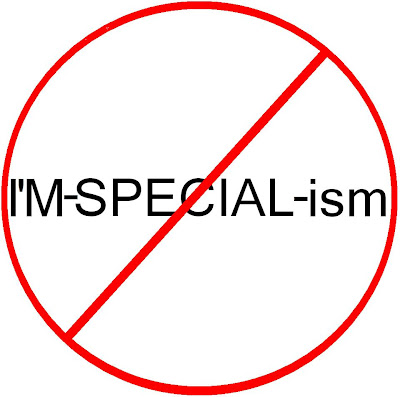




PHL 121-02
Camden County College
Spring 2008

Here are some links on advertising and news. The first is about the underlying intellectual dishonesty in even the most honest of ad campaigns. By the way, if you're into advertising, that entire blog is great. I'm a bit biased, though, since I used to work for Bob Garfield.
The second is a radio interview with the director of FactCheck.org, a website devoted to debunking claims in political ads. I also used to work with the guy who interviewed FactCheck's director. Yup, I'm a pretty big deal.
Now for some news stuff. Lots of people worry about conservative or liberal news media bias. But there are several interesting biases that are much less talked about. Here's a discussion of the bias toward anything that's dangerous.

So you didn't believe me when I said that there are experts on the subject of penguin digestion? Oh, you did? Fine, well, I'll prove it to you, anyway. Here are some academic articles on the topic:
Attendance is mandatory for the group presentations on Friday (5/2/07), Monday (5/5/07), and Wednesday (5/7/07). It's the only time I'll be a stickler for it. Basically, I want you to show respect for the other groups presenting.One last thing: be sure to keep the presentations under 15 minutes. A 10-minute presentation is ideal, so we can have time for a short question-and-answer session afterwards.
If you don't attend on either the days your group isn't presenting (and your absence isn't excused), your own personal presentation grade will drop. Each day you don't attend will lower your grade by a full letter grade.

This may sound insulting, but one of the goals of this class is getting us to recognize that we're not as smart as we think we are. All of us. You. Me. That guy. You again."How can we better believe what is true? While it is of course useful to seek and study relevant information, our minds are full of natural tendencies to bias our beliefs via overconfidence, wishful thinking, and so on. Worse, our minds seem to have a natural tendency to convince us that we are aware of and have adequately corrected for such biases, when we have done no such thing."

This mini-article on acne and anxiety raises a combo platter of questions relevant to what we're going over in class.
1) Reverse causation: Does acne cause stress, or does stress cause acne?What say you?
2) Questionable statistics: Do you trust the stat that students were 23 percent more likely to experience breakouts around the time of a test? Is it a good study? A reliable source? An undemanding stat?
3) Questionable use of statistics: If the above statistic is true, is it reasonable to conclude that anxiety causes acne? Or is there another plausible explanation?

My best friend the inter-net has some nice examples of the fallacy of equivocation. Here are two good ones:
 And here's the video for Mims's logically delicious song "This is Why I'm Hot":
And here's the video for Mims's logically delicious song "This is Why I'm Hot":
Singer: How Much Should We Give?
just try to think up a more important topic
The Dark Art of Interrogation
Bowden sez torture is necessary
Can Foreign Aid Work?
didn't expect Kristof to bring up Darfur
NYT Editorial: The White House's Real Agenda
sunday editorials mean Big Picture time
Against Free Speech
but it's free, so it must be good
Is Wal-Mart Good for the Working Class?
Furman: walmart helps poor consumers more than it hurts poor workers. Ehrenreich: I call bs
What pro-lifers miss in the stem-cell debate
love embryos? then hate fertility clinics
Is Worrying About the Ethics of Your Diet Elitist?
since you asked, no
Abstinence campaign hits dead end on HPV
WSJ: White House vs. NYT on bank surveillance
on Keller's "leap of faith" (see below)
Keller's Letter on NYT's Banking Records Report
Is Selling Organs Repugnant?
freakonomicists for a free-market for organs
Should I Become a Professional Philosopher?
hell 2 da naw
Blackburn Defends Philosophy
it beats being employed

(P1) All toasters are items made of gold.I want some future-toast, spread with alternate-1985 mixed fruit jelly.
(P2) All items made of gold are time travel devices.
(C) All toasters are time travel devices.
(P1) This pen writes with black ink.His homework was tough to grade.
(P2) Black ink from pens sets paper on fire.
(P3) I'm writing on this paper right now.
(C) This paper is on fire.
(P1) Girlfriends is a TV show.Slate agrees!
(P2) All TV shows are good.
(C) Girlfriends is a good show.
(P1) If Sean wears a Journey t-shirt, he is lame.I wish the second premise were false.
(P2) Sean wears a Journey t-shirt.
(C) Sean is lame.

 OK, before we start rocking all night, perhaps we should come up with a name for our logic band. What's a good name for us? Don & the Fugly Emo Kids?
OK, before we start rocking all night, perhaps we should come up with a name for our logic band. What's a good name for us? Don & the Fugly Emo Kids?So why does this course have a blog? Well, why is anything anything?
A blog (short for “web log”) is a website that works like a journal – users write posts that are sorted by date based on when they were written. You can find important course information (like assignments, due dates, reading schedules, etc.) on the blog. I’ll also be updating the blog throughout the semester, posting interesting items related to the stuff we’re currently discussing in class. I used a blog for this course last semester, and it seemed helpful. Hopefully it can benefit our course, too.
Since I’ll be updating the blog a lot throughout the semester, you should check it frequently. There are, however, some convenient ways to do this without simply going to the blog each day. The best way to do this is by getting an email subscription, so any new blog post I write automatically gets emailed to you. (You can also subscribe to the rss feed, if you know what that means.) To get an email subscription:
1. Go to http://ccclogic08.blogspot.com.
2. At the main page, enter your email address at the top of the right column (under “EMAIL SUBSCRIPTION: Enter your Email”) and click the "Subscribe me!" button.
3. This will take you to a new page. Follow the directions under #2, where it says “To help stop spam, please type the text here that you see in the image below. Visually impaired or blind users should contact support by email.” Once you type the text, click the "Subscribe me!" button again.
4. You'll then get an email regarding the blog subscription. (Check your spam folder if you haven’t received an email after a day.) You have to confirm your registration. Do so by clicking on the "Click here to activate your account" link in the email you receive.
5. This will bring you to a page that says "Your subscription is confirmed!" Now you're subscribed.
If you are unsure whether you've subscribed, ask me (609-980-8367; slandis@camdencc.edu). I can check who's subscribed and who hasn't.
